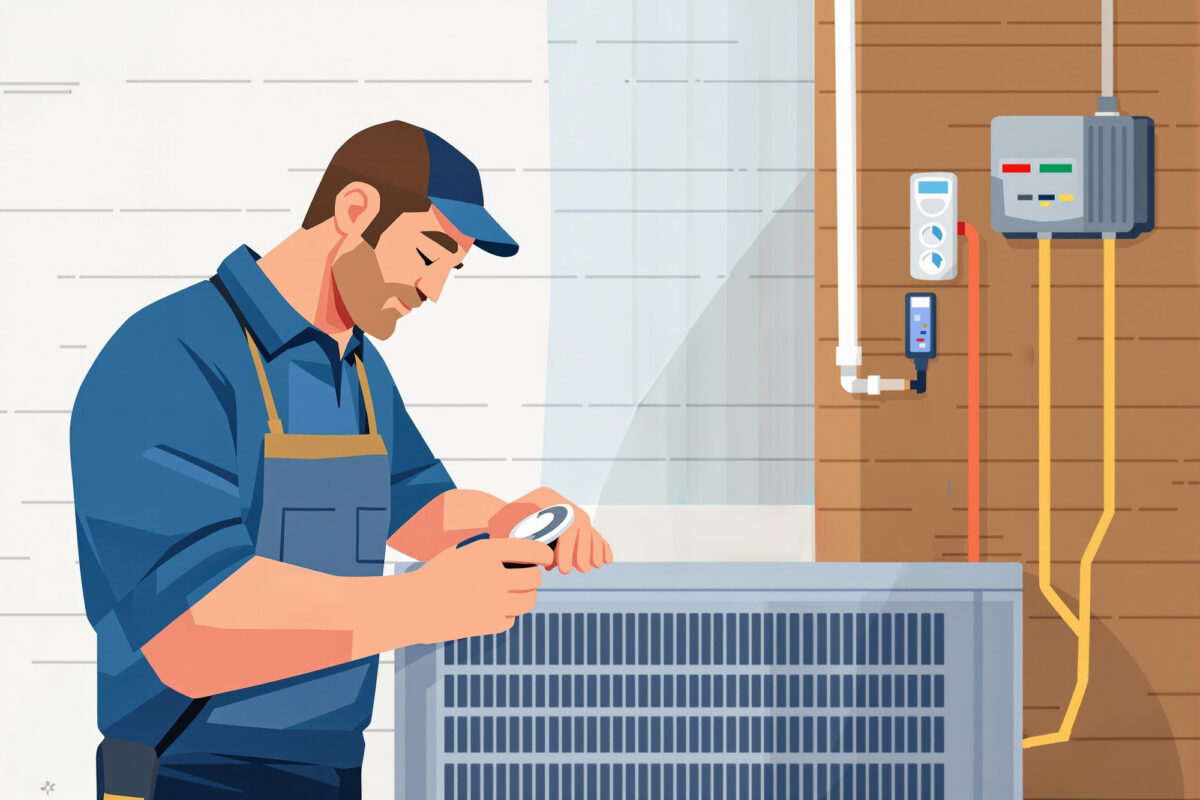Introduction to HVAC Company Marketing Essentials
When embarking on the journey of marketing for an HVAC company, understanding the foundational elements is paramount. A tailored marketing strategy is not just beneficial but crucial for success in the highly competitive HVAC industry. It's the blueprint that guides all efforts, ensuring they are cohesive, targeted, and effective.
Why Tailored Marketing Strategies Are Vital
For HVAC companies, differentiation in the market hinges on a marketing strategy that speaks directly to the unique needs of both the business and its customers. This strategy should encompass a deep understanding of the HVAC market, the latest digital marketing trends, and the specific goals of the company.
Differentiation in a Competitive Market
HVAC companies can stand out by showcasing their expertise, leveraging customer testimonials, and highlighting their unique selling propositions. It's about communicating what makes your services superior or differentbe it faster response times, specialized technology, or exceptional customer service.
The Role of Digital Marketing
Digital marketing efforts are integral to the overall business strategy for HVAC companies. They serve as the connective tissue between potential customers and the services offered, utilizing SEO, PPC, content marketing, and more to ensure that when customers are searching for HVAC solutions, your company is prominently visible and top of mind.
Decoding SEO: Maximizing Online Visibility for HVAC Services
Effective Search Engine Optimization (SEO) is pivotal for HVAC companies aiming to enhance their online visibility. By implementing specific SEO strategies, your business can climb the search engine rankings, making it easier for potential customers to find your services.
Tailored SEO Strategies for HVAC Companies
To improve search rankings, HVAC companies should focus on:
- Keyword Research: Identifying HVAC-related terms that potential customers are searching for.
- On-Page Optimization: Ensuring that website content, including titles, headings, and meta descriptions, are optimized for these keywords.
- Quality Backlink Profile: Building links from reputable sources to establish domain authority.
Local SEO: Connecting with the Community
Local SEO is essential for HVAC companies as it targets service areas and community-specific searches. This includes:
- Google My Business Optimization: Accurate and complete profiles help appear in local search results.
- Local Directory Listings: Ensuring presence in local online directories to improve local visibility.
The Importance of Keyword Research
Keyword research is crucial because:
- It identifies the exact search terms used by your target audience.
- It informs content creation, aligning with what potential customers are seeking.
Regular Technical SEO Audits
HVAC companies should conduct technical SEO audits:
- To ensure compliance with Google's ever-evolving algorithms.
- To identify and fix issues that could hinder search engine rankings, such as broken links or slow page load times.
By addressing these areas, HVAC companies can significantly improve their online presence and attract more customers.
Pay-Per-Click Advertising: A Fast Track to Customer Acquisition
Pay-Per-Click (PPC) advertising serves as a dynamic tool for HVAC companies to gain instant visibility in a competitive digital landscape. By leveraging PPC campaigns, your business can appear prominently in search engine results, driving immediate traffic to your website.
Instant Visibility Through PPC
PPC campaigns offer HVAC services the advantage of:
- Immediate Exposure: Your ads start showing as soon as the campaign goes live, providing instant visibility.
- Top Placement: Ads often appear above organic search results, increasing the likelihood of clicks.
Targeting Options in PPC
HVAC companies can utilize various targeting options in PPC to reach their ideal customers:
- Geographic Targeting: Ads are shown to users in specific locations where HVAC services are offered.
- Keyword Targeting: Ads are triggered by searches for specific HVAC-related terms.
- Demographic Targeting: Ads are displayed to segments of the population most likely to need HVAC services.
The Role of PPC in Digital Marketing
PPC is a key component of a comprehensive digital marketing strategy because it:
- Complements organic SEO efforts by covering different aspects of search engine presence.
- Provides measurable results that inform the overall marketing strategy.
Measuring PPC Success
Success in PPC for HVAC companies is measured by:
- Click-Through Rate (CTR): The percentage of people who click on the ads after seeing them.
- Conversion Rate: The percentage of ad clicks that result in a desired action, such as a service inquiry.
- Return on Ad Spend (ROAS): The revenue generated for every dollar spent on PPC campaigns.
By analyzing these metrics, HVAC companies can refine their PPC strategies for optimal performance and ROI.
Social Media Strategies: Building Engagement and Brand Loyalty
Social media platforms offer HVAC companies a unique opportunity to connect with their audience and build brand loyalty. The effectiveness of these platforms varies, with each offering distinct advantages for engaging potential customers.
Selecting the Right Platforms for HVAC Companies
For HVAC companies, the most effective social media platforms are:
- Facebook: With its vast user base, Facebook allows for detailed targeting and customer interaction.
- Instagram: A visually-driven platform ideal for showcasing before-and-after images of HVAC projects.
- LinkedIn: Perfect for B2B connections and establishing industry expertise.
Crafting Engaging Social Media Content
HVAC companies can create content that resonates by:
- Sharing tips on maintaining HVAC systems.
- Posting about the latest industry trends and technologies.
- Offering special promotions and seasonal discounts.
The Importance of Customer Interaction
Direct customer interaction on social media:
- Provides real-time customer service.
- Builds trust through prompt and personal responses.
- Encourages feedback and fosters a community around your brand.
Consistency in Social Media Presence
A consistent social media presence is crucial for HVAC companies because it:
- Keeps the brand top-of-mind for followers.
- Demonstrates commitment to customer engagement.
- Helps maintain an active and dynamic brand image.
By leveraging these strategies, HVAC companies can enhance their social media presence, leading to increased engagement and customer loyalty.
Email Marketing: Nurturing Leads and Establishing Expertise
Email marketing is a strategic tool for HVAC companies to cultivate lasting relationships with their audience. By delivering valuable content directly to inboxes, your company can reinforce its position as a trusted authority in the HVAC industry.
Content That Demonstrates HVAC Expertise
Your email content should:
- Provide maintenance tips and energy-saving advice to showcase your knowledge.
- Include updates on the latest HVAC technologies and trends.
- Feature case studies that highlight your company's successful projects.
The Role of Segmentation in Email Campaigns
Segmentation is crucial in email marketing because it allows you to:
- Tailor messages to specific groups within your audience based on their interests and behaviors.
- Increase the relevance of your content, which can lead to higher engagement rates.
Communication Frequency with Your Email List
HVAC companies should consider the following when deciding how often to email their list:
- Regular Updates: Monthly newsletters keep your audience informed without overwhelming them.
- Seasonal Promotions: Additional emails may be warranted during peak seasons when HVAC services are in high demand.
By adhering to these practices, HVAC companies can leverage email marketing to build meaningful connections with customers and reinforce their market expertise.
Content Marketing: Educating Customers and Building Trust
Content marketing for HVAC companies involves creating and sharing valuable content to attract and retain a clearly defined audience. By educating potential customers, your company can establish trust and position itself as an industry leader.
Effective Content Types for HVAC Companies
The most effective content for HVAC companies includes:
- How-to Guides: Step-by-step instructions on common HVAC maintenance tasks.
- Infographics: Visual representations of energy-saving tips or HVAC system care.
- Blog Posts: Regular updates on HVAC trends and new technologies.
Establishing Trust Through Educational Content
Educational content establishes trust by:
- Demonstrating your expertise and willingness to share knowledge.
- Helping customers make informed decisions about their HVAC needs.
The Significance of E-A-T in HVAC Content Marketing
The E-A-T principle is crucial because it ensures that:
- Content reflects the expertise of your HVAC professionals.
- Information is authoritative and comes from a place of industry knowledge.
- Trustworthiness is conveyed through accurate and helpful content.
Aligning Content with Brand Values
HVAC companies can align content with their brand values by:
- Ensuring all content is consistent with the company's mission and customer service philosophy.
- Addressing topics that resonate with the company's core audience and their specific needs.
By focusing on these elements, HVAC companies can use content marketing to effectively educate their audience and build a trustworthy brand.

Leveraging Google My Business for Local Market Penetration
Optimizing a Google My Business (GMB) profile is a strategic move for HVAC companies seeking to enhance their local market presence. A well-managed GMB listing can significantly increase a company's visibility in local search results.
Maximizing Impact with Google My Business
HVAC companies can optimize their GMB profiles by:
- Ensuring all business information is accurate and up-to-date.
- Including high-quality images of services, staff, and completed projects.
- Regularly posting updates and offers to engage with the local audience.
Engaging Customers Through Google My Business
Active customer interaction on GMB offers several benefits:
- It encourages positive reviews, which can improve the company's online reputation.
- It allows for direct responses to customer inquiries, showcasing excellent customer service.
The Importance of Google My Business in Local SEO
GMB is a critical tool for local SEO because:
- It provides a platform for businesses to appear in Google's Local Pack, enhancing visibility.
- It helps businesses appear in location-based searches, which are common among mobile users.
Tracking Google My Business Performance
HVAC companies can track their GMB listing's performance by:
- Monitoring insights provided by GMB, which include metrics like search visibility, customer actions, and engagement.
- Analyzing the impact of GMB on website traffic and service inquiries.
By focusing on these strategies, HVAC companies can effectively use Google My Business to connect with their local community and drive more business.
The Power of Online Reviews in HVAC Marketing
Online reviews are a cornerstone of digital reputation for HVAC companies, influencing potential customers' perceptions and decisions. Positive reviews can significantly boost a company's credibility, while negative feedback presents opportunities for improvement and customer engagement.
Encouraging Positive Reviews from Customers
HVAC companies can encourage positive reviews by:
- Providing exceptional service that exceeds customer expectations.
- Gently reminding satisfied customers to share their experiences online.
- Offering incentives for customers who take the time to leave a review.
Responding to Negative Feedback
When faced with negative reviews, HVAC companies should:
- Address the feedback promptly and professionally.
- Offer solutions to resolve any issues raised by the customer.
- Use the feedback as a learning opportunity to improve services.
Authenticity in Online Review Management
Authenticity is crucial in managing online reviews because:
- Potential customers are more likely to trust genuine and honest responses.
- Authentic interactions demonstrate a company's commitment to customer satisfaction.
By actively managing online reviews, HVAC companies can enhance their digital presence and foster trust with both current and prospective customers.
Website Optimization: Enhancing User Experience for Conversion
Creating a user-friendly website is essential for HVAC companies to convert visitors into customers. A well-optimized site not only supports SEO efforts but also provides a seamless user experience that can lead to increased engagement and conversions.
Key Elements of a User-Friendly HVAC Website
A user-friendly HVAC website should include:
- Intuitive Navigation: Easy-to-use menus and clear calls to action guide visitors through your services.
- Relevant Content: Up-to-date and informative content that addresses your customers' HVAC needs.
- Responsive Design: A layout that adapts to various screen sizes, ensuring accessibility across all devices.
Ensuring Mobile-Friendliness
To ensure your website is mobile-friendly:
- Implement a responsive design that automatically adjusts to fit the screen of smartphones and tablets.
- Test your website on multiple devices to ensure compatibility and usability.
The Importance of Page Speed
Page speed is a critical factor because:
- Faster loading times improve user experience and reduce bounce rates.
- Search engines favor websites that load quickly, which can enhance your SEO rankings.
Metadata and On-Page SEO
Metadata and on-page elements contribute to SEO performance by:
- Providing search engines with concise information about the content of your pages.
- Helping to improve the visibility of your website in search engine results pages (SERPs).
By focusing on these aspects, HVAC companies can optimize their websites to provide a better user experience, which is instrumental in driving conversions and improving online performance.
CRM Systems: Streamlining Customer Data and Relationships
Customer Relationship Management (CRM) systems are integral for HVAC companies to centralize customer data and manage relationships effectively. The right CRM system can transform your business operations, making your marketing efforts more personalized and efficient.
Essential Features in a CRM for HVAC Companies
When selecting a CRM, HVAC companies should look for:
- Data Centralization: A unified platform to store all customer information.
- Marketing Automation: Tools to automate and track marketing campaigns.
- Service Tracking: Features to monitor service calls and customer interactions.
Benefits of Centralizing Customer Data
Centralizing customer data allows HVAC companies to:
- Gain a comprehensive view of customer interactions.
- Enhance customer service by quickly accessing detailed customer histories.
- Streamline communication across different departments.
The Role of Relationship Management in Business Growth
Effective relationship management is vital for growth as it:
- Fosters long-term customer loyalty.
- Identifies opportunities for upselling and cross-selling services.
- Improves customer satisfaction through personalized interactions.
Personalization Through CRM
CRM systems aid in personalizing marketing by:
- Segmenting customers based on their preferences and service history.
- Tailoring communications to address individual customer needs.
- Tracking customer responses to refine marketing strategies.
By leveraging these CRM capabilities, HVAC companies can enhance their customer engagement and drive business growth.
Generating Quality Leads: Targeting the Right Customers for HVAC Services
Attracting high-quality leads is a critical component of a successful HVAC marketing strategy. By focusing on targeted strategies, HVAC companies can connect with potential customers who are most likely to need their services.
Strategies for Attracting High-Quality HVAC Leads
To generate leads that are more likely to convert, HVAC companies should consider:
- Content Marketing: Sharing valuable information that addresses common HVAC issues to attract engaged users.
- SEO: Optimizing for HVAC-related keywords to capture traffic from users actively searching for HVAC solutions.
- PPC Campaigns: Using targeted ads to reach specific demographics or geographic areas.
The Role of Service Matching in Lead Generation
Service matching enhances lead generation by:
- Aligning marketing efforts with the specific services that potential customers are seeking.
- Ensuring that leads have a higher intent to purchase or engage with your HVAC services.
The Importance of Customer Targeting
Effective customer targeting is essential because it:
- Increases the efficiency of marketing spend by focusing on users with a higher likelihood of needing HVAC services.
- Improves the relevance of marketing messages, which can lead to better engagement rates.
Measuring Lead Quality
HVAC companies can measure the quality of their leads by analyzing:
- Conversion Rates: Tracking how many leads turn into paying customers.
- Engagement Metrics: Monitoring how leads interact with your website and content.
- Customer Feedback: Gathering insights from leads about how well services match their needs.
By implementing these strategies, HVAC companies can not only increase the quantity of their leads but also improve the quality, leading to better conversion rates and a more robust customer base.
Continuous Improvement in HVAC Marketing Tactics
HVAC companies can stay ahead of the curve by regularly evaluating and refining their marketing strategies. This involves analyzing performance data, staying informed about industry changes, and being willing to implement new techniques.
Staying Abreast of Digital Marketing Trends
To remain competitive, HVAC companies should:
- Monitor emerging digital marketing trends, such as the use of AI for personalized marketing.
- Attend industry webinars and workshops to learn about the latest digital tools and platforms.
The Importance of Adapting Marketing Strategies
Adapting marketing strategies is crucial because:
- Consumer behaviors and preferences evolve, necessitating changes in how companies reach and engage with their audience.
- Technological advancements can create new marketing opportunities that can be more effective and efficient.
Ensuring Cost-Effectiveness and High ROI
HVAC companies can ensure their marketing efforts are cost-effective by:
- Setting clear goals and KPIs to measure the success of marketing campaigns.
- Using analytics to track performance and adjust strategies for maximum impact with minimal waste.
By focusing on these areas, HVAC companies can enhance their marketing efforts, ensuring they are both effective in reaching their target audience and efficient in terms of investment and resources.



